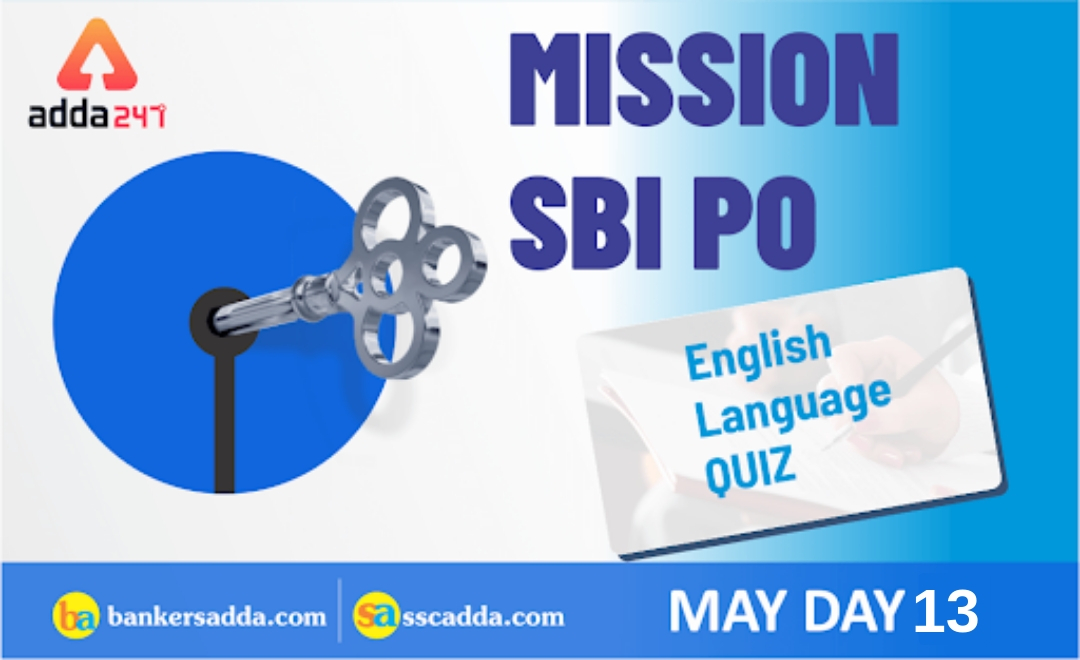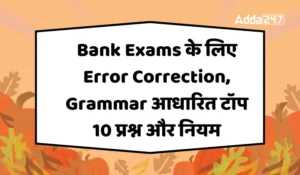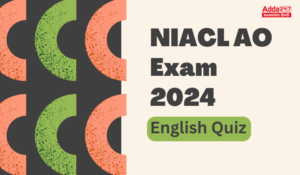The State Bank of India conducts a three-level examination to recruit Probationary Officers every year. Thus, the English Language can be an impetus for your success as it helps you save crucial time and score good points in lesser time and effort. So, instead of boiling the ocean, try building up a strong vocabulary, an effective knowledge of grammar, and efficient comprehension skills so as to be on the ball to face this particular section. Here is a quiz on English Language being provided by Adda247 to let you practice the best of latest pattern English Questions for SBI PO Examination 2019-20.
Directions (1-5): In each of the following question a sentence is given with four highlighted words. Choose the alternative reflecting the appropriate positions of the words that must replace each other to form a grammatically correct and contextually meaningful sentence. If no replacement is required, mark (e) i.e. “no error” as your answer choice.
Q1. Many (A) countries are keeping their money in (B) overseas banks because the tax laws are less (C) stringent in foreign (D) Americans.
A - B
B - C
C - D
A - D
No error
Solution:
The given sentence is grammatically as well as contextually incorrect. To frame a meaningful sentence, ‘Americans’ and ‘countries’ should be interchanged. It should be noted that the preposition in is used to denote a place rather than persons. Therefore, “in foreign countries” is a more suitable phrase. Hence, by swapping words (A) and (D), option (d) becomes the most suitable answer choice.
Q2. The Bandipur Tiger (A) Reserve on the Karnataka border (B) spilling some of our (C) richest wildlife areas (D) contains over into Tamil Nadu and Kerala.
A - B
B - D
C - D
A - C
No error
Solution:
The given sentence is grammatically as well as contextually incorrect. To frame a meaningful sentence, ‘spilling’ and ‘contains’ should be interchanged. It should be noted that spilling over is a phrasal verb which means to reach or influence a larger area; spread. Hence, by swapping words (B) and (D), option (b) becomes the most suitable answer choice.
Q3. United Voice, which represents (A) government, has called for the Queensland (B) paramedics to fund the (C) positions after the latest Queensland Health data showed (D) ramping was increasing.
A - B
B - C
C - D
A - C
No error
Solution:
The given sentence is grammatically as well as contextually incorrect. To frame a meaningful sentence, ‘government’ and ‘parademics’ should be interchanged. Hence, by swapping words (A) and (B), option (a) becomes the most suitable answer choice.
Q4. Eighteen per cent of the world’s (A) population lives in India, but the country (B) global 26 per cent of the (C) bears disease (D) burden due to air pollution.
A - B
B - C
C - D
A - C
No error
Solution:
The given sentence is grammatically as well as contextually incorrect. To frame a meaningful sentence, ‘global’ and ‘bears’ should be interchanged. Hence, by swapping words (B) and (C), option (b) becomes the most suitable answer choice.
Q5. (A) Institutions of higher (B) education ought to be(C) riveted to reading, writing and learning how to think and how to (D) implement.
A - B
B - C
C - D
A - C
No error
Solution:
The given sentence, along with the arrangement of the highlighted words is correct and do not require any interchange. Therefore, option (e) is the most suitable answer choice.
Directions (6-10): In the questions given below, there is a sentence in which one part is given in bold. The part given in bold, may or may not be grammatically correct. Choose the best alternative among the four given which can replace the part in bold to make the sentence grammatically correct. If the part given in bold is already correct and does not require any replacement, choose option (e), i.e. “No replacement required” as your answer.
Q6. Every officer and every resident of this village is determined to do their best to get better ranking in sanitation index.
to do there best
to do its best
to do his best
to do ones best
No replacement required
Solution:
Here, we will replace 'their' with 'his'. When two singular nouns are connected by 'and' and 'each' or 'every' is used before them, then they are considered as singular nouns. In such cases, the verb used with them will be in singular form and the pronoun used for the subject will also be singular. Hence, option (c) is the correct answer.
Q7. Now-a-days he teaches mathematics because the mathematics teacher is absenting himself for a month.
now-a-days he teach
now-a-days he is teaching
now-a-days he taught
now-a-days he was teaching
No replacement required
Solution:
Here, 'he teaches' will be replaced by 'he is teaching’ because for a temporary task of present, we will use present imperfect tense. Hence, option (b) is the correct answer.
Q8. India and China's present conditions clearly indicate that both the countries will soon emerge as Asian superpowers.
India and China present conditions
India's and China's present conditions
India-China's present conditions
Indian and China's present conditions
No replacement required
Solution:
Here, we will use 's (apostrophe 's') with India. India's will denote the present conditions prevailing in India. If two nouns are joined by 'and' and both of them have separate features and are unrelated then we use 's (apostrophe 's') with both of them.
Q9. Before he had reached the station, the plane had already left.
he reached
he has reached
he would reach
he would have reached
No replacement required
Solution:
Here, 'he had reached' will be replaced by 'he reached' because when two incidences of past are mentioned in a single sentence, in the main clause we will use past perfect tense whereas in the clause with before, when, etc. we will use past indefinite tense. Hence, option (a) is the correct answer.
Q10. Some media organisations and analysts have mistakenly described the Council as having adopted a resolution.
analysts has mistakenly
analysts were mistakenly
analysts could mistakenly
analysts had had mistakenly
No replacement required
Solution:
The given statement is grammatically correct and thus requires no correction. Hence, option (e) is the correct answer.
Directions (11-15): In the questions given below, a sentence is given with a phrasal verb highlighted. Following are the four words that try to decipher the meaning of the given phrase. Choose the word which correctly illustrates the meaning of the highlighted phrase. If none of the given words correctly mentions the meaning of the phrasal verb, choose option (e) i.e. “none of these” as the answer choice.
Q11. We've been angling for a contract with a major development company from the Middle East for the last few months.
revolving
promoting
inducing
chasing
None of these
Solution:
“Angling for” means they are trying to get something without asking for it directly. “Inducing” [verb] means succeed in persuading or leading (someone) to do something. Therefore, ‘inducing’ appropriately illustrate the meaning of the given phrasal verb. All the other words fail to elucidate its meaning. Hence, option (c) is the most suitable answer choice.
Revolving means consider (something) repeatedly and from different angles.
Chasing means pursue in order to catch or catch up with.
Q12. I'd prefer you come with me now. We could argue out the details and ramifications once we're out of here.
procure
proliferate
deliver
deliberate
None of these
Solution:
If two or more people argue something out, they discuss it or thoroughly in order to reach a conclusion or decision. “Deliberate” [verb] means engage in long and careful consideration. Therefore, ‘deliberate’ appropriately illustrate the meaning of the given phrasal verb. All the other words fail to elucidate its meaning. Hence, option (d) is the most suitable answer choice.
Procure means obtain (something), especially with care or effort.
Proliferate means increase rapidly in number; multiply.
Q13. The businesslike mood contrasted with Trump’s fawning over Macron at a state dinner in April.
flattering
illustrating
discussing
castigating
None of these
Solution:
“Fawning over” means to flatter someone or attend to someone excessively; to curry favor with someone. “Flattering” [verb] means lavish praise and compliments on (someone), often insincerely and with the aim of furthering one's own interests. Therefore, ‘flattering’ appropriately illustrate the meaning of the given phrasal verb. All the other words fail to elucidate its meaning. Hence, option (a) is the most suitable answer choice.
Castigating means reprimand (someone) severely.
Q14. The lecturer asked the students to pipe down and pay attention.
hush
ponder
examine
concentrate
None of these
Solution:
“Pipe down” means to stop talking; be less noisy. “Hush” [verb] means make (someone) be quiet or stop talking. Therefore, ‘Hush’ appropriately illustrate the meaning of the given phrasal verb. All the other words fail to elucidate its meaning.
Hence, option (a) is the most suitable answer choice.
Ponder means think about (something) carefully, especially before making a decision or reaching conclusion.
Concentrate means focus all one's attention on a particular object or activity.
Q15. He’s always popping off when things don’t suit him.
appreciating
instigating
investigating
complaining
None of these
Solution:
“Popping off” means to talk thoughtlessly and often loudly or angrily. “Complaining” [verb] means express dissatisfaction or annoyance about something. Therefore, ‘Complaining’ appropriately illustrate the meaning of the given phrasal verb. All the other words fail to elucidate its meaning. Hence, option (d) is the most suitable answer choice.
Instigating means bring about or initiate (an action or event).
Investigating means carry out research or study into (a subject or problem, typically one in a scientific or academic field).





 Practice for English Section: 15 Cloze T...
Practice for English Section: 15 Cloze T...
 Bank Exams के लिए Error Correction, Gram...
Bank Exams के लिए Error Correction, Gram...
 English Quiz For NIACL AO Mains 2024 Exa...
English Quiz For NIACL AO Mains 2024 Exa...










